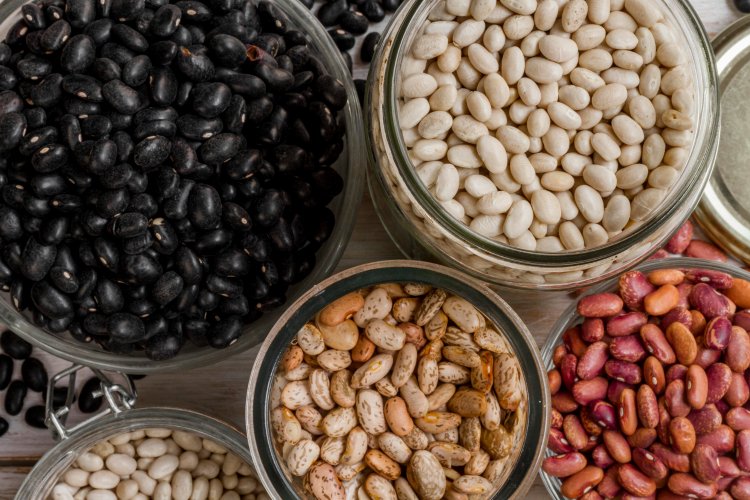Nutritional Facts
Beans are renowned for their impressive nutritional profile, packed with essential nutrients that contribute to overall health and well-being. While the specific nutrient composition varies among different types of beans, they generally offer an array of vitamins, minerals, protein, and dietary fiber. A one-cup serving of cooked beans typically contains:
-
Protein: Beans are a valuable source of plant-based protein, making them an excellent choice for vegetarians, vegans, and individuals looking to reduce their consumption of animal products. The protein content of beans varies but generally ranges from 15 to 20 grams per cup, providing the body with the necessary building blocks for muscle repair, tissue regeneration, and overall growth.
-
Fiber: Beans are rich in dietary fiber, both soluble and insoluble, which plays a crucial role in digestive health, cholesterol management, and blood sugar regulation. The high fiber content of beans promotes satiety, aids in weight management, and supports healthy bowel function by preventing constipation and promoting regularity. Additionally, soluble fiber found in beans helps lower cholesterol levels and improve heart health by reducing the absorption of cholesterol in the bloodstream.
-
Vitamins and Minerals: Beans are a rich source of essential vitamins and minerals, including folate, iron, potassium, magnesium, and zinc. Folate, also known as vitamin B9, is particularly abundant in beans and is essential for DNA synthesis, red blood cell formation, and fetal development during pregnancy. Iron is vital for oxygen transport and energy production, while potassium helps regulate blood pressure and maintain fluid balance in the body. Magnesium and zinc play critical roles in various physiological processes, including muscle function, immune support, and bone health.
Health Effects
In addition to their nutritional value, beans offer a multitude of health benefits that can positively impact overall well-being and disease prevention. Incorporating beans into a balanced diet has been associated with several notable health effects, including:
-
Heart Health: Beans are heart-healthy foods that can help lower the risk of cardiovascular disease and improve heart function. The soluble fiber found in beans helps lower LDL (bad) cholesterol levels, thus reducing the risk of atherosclerosis and coronary artery disease. Furthermore, the potassium content of beans helps regulate blood pressure and maintain cardiovascular health by promoting vasodilation and reducing the strain on the heart.
-
Weight Management: Beans are a valuable ally in weight management and obesity prevention due to their high fiber and protein content. Fiber promotes feelings of fullness and satiety, preventing overeating and excessive calorie consumption. Moreover, protein helps maintain lean muscle mass, increases metabolic rate, and enhances energy expenditure, all of which contribute to weight loss and weight maintenance.
-
Blood Sugar Control: Beans have a low glycemic index and are rich in complex carbohydrates and soluble fiber, making them an excellent choice for individuals with diabetes or insulin resistance. The slow digestion and absorption of carbohydrates in beans result in gradual increases in blood sugar levels, preventing spikes and crashes that can occur with high-glycemic foods. Additionally, soluble fiber helps improve insulin sensitivity and glycemic control, reducing the risk of hyperglycemia and diabetic complications.
Culinary Uses
One of the most appealing aspects of beans is their culinary versatility, as they can be incorporated into a wide range of dishes to add flavor, texture, and nutritional value. Some popular culinary uses for beans include:
-
Soups and Stews: Beans are a staple ingredient in soups and stews, adding depth, richness, and protein to these hearty dishes. Whether used as the main protein source or as a complementary ingredient alongside vegetables and grains, beans contribute to the robust flavor and satisfying texture of soups and stews. Common bean varieties used in soups and stews include black beans, kidney beans, chickpeas, and lentils.
-
Salads: Beans make a nutritious addition to salads, providing protein, fiber, and a variety of textures and flavors. They can be used in both cold and warm salads, paired with an assortment of ingredients such as leafy greens, vegetables, fruits, nuts, and cheeses. Bean salads are often dressed with vinaigrettes or citrus-based dressings to enhance their freshness and vibrancy.
-
Dips and Spreads: Beans can be mashed or pureed to create delicious dips and spreads, such as hummus, bean dip, and bean spread. These versatile dips are perfect for snacking, appetizers, or party platters, and can be served with crackers, bread, pita chips, or vegetable crudités. They can also be customized with various herbs, spices, and flavorings to suit individual preferences.
-
Main Dishes: Beans can take center stage in vegetarian and vegan main dishes, offering a nutritious and satisfying alternative to meat-based meals. They can be used to make bean burgers, bean chili, bean tacos, bean burritos, bean casseroles, and bean-based curries, among other dishes. Beans can be seasoned and flavored in countless ways to create delicious and satisfying meals for individuals of all dietary preferences.
Disclaimer
The information provided in this article is for educational purposes only and should not be considered medical advice. If you have any health concerns or are experiencing symptoms, it is important to consult with a healthcare professional, such as a doctor or clinic, for proper diagnosis and treatment. Always seek the advice of your doctor or other qualified health provider with any questions you may have regarding a medical condition. Do not disregard professional medical advice or delay in seeking it because of something you have read in this article.
#Beans #Nutrition #HealthBenefits #PlantBased #HeartHealth #WeightManagement #BloodSugarControl #CulinaryUses #HealthyEating






















